
[ad_1]
More than a year after the Cambodian government cracked down on online slavery scams, anti-trafficking groups say they are still operating on a large scale, casting doubt on official claims that Cambodia has effectively tackled the problem.
Cambodia has received widespread attention for its human trafficking epidemic, with workers forced to work using online scams to entrap victims overseas. In September 2022, the government raided scam sites, arresting and deporting thousands of people.
Cambodian authorities have since said they have reduced human trafficking, questioned a United Nations estimate of 100,000 victims in Cambodia and accused news media of “baseless” reporting.
Meanwhile, international attention has turned to growing cyber slavery in northern Myanmar and along the Thai-Myanmar border.
But victims’ rights groups say some establishments did not close during the crackdown but temporarily relocated before reopening in Cambodia. NGOs say identifying and rescuing victims is made more difficult by the government’s public denials about the scale of the industry.
“From what we have observed, online scams have not decreased,” Tola Moen, executive director of the Phnom Penh Labor and Human Rights Alliance Center, told VOA. “We don’t know why there is no clear action and we still see this happening.”
“It is clear that the volume of human trafficking entering Cambodia for forced fraud has returned to pre-September 2022 levels, and may even exceed that,” another international observer working on the issue told VOA, speaking on condition of anonymity to maintain relations with the government.
Company Relocation
When police arrived in Sihanoukville, a notorious trafficking hotspot, in September 2022, buildings across the city were empty.
Michael, a 38-year-old Taiwanese trafficking victim at the so-called Huang Le compound in Sihanoukville who spoke to VOA by phone from Indonesia using an alias, recalled that companies were scrambling to move business.
“A lot of companies had just relocated at that time,” Michael said, “and our company decided to relocate as well.”
Some agents went to Burma, others stayed in Cambodia. Michael was taken to a compound in the town of Osmahe near the Thai border.
Other companies in Sihanoukville are run by only a lean staff, according to the Global Anti-Scam Organization (GASO), which helps free trafficking victims across Southeast Asia.
“Some buildings in Sihanoukville look empty … but they do have victims of human trafficking inside,” said Alicia, a GASO worker who asked to be identified only by her first name so she could speak freely. “I can’t say they’ve all moved away or stopped completely. … Some are still operating in secret, scamming people online.”
Over the next six months, Michael moved between three residences in Cambodia. By June 2023, he was sold to Goldwater, a well-known scam center in Sihanoukville’s Chinatown. He began receiving training, posing as an Amazon subsidiary, trying to convince people to invest.
Michael said several buildings in the Jinshui District are already filled with trafficked workers from China, Indonesia, South Korea and Japan, and other buildings in Chinatown are also crowded.
“A building can accommodate [up to] “800 people,” he said. “We have at least 400 to 500 people in the company.”
Return to Sihanoukville
Observers say the reopening of Chinatown is a sign of the return of scams to Sihanoukville.
Jacob Sims, senior technical adviser for the anti-trafficking group International Justice Mission, told VOA that China’s crackdown on Myanmar compounds and its “Operation 1027” targeting Myanmar’s military junta have led to a resurgence of fraud activities along the Myanmar-Thailand border, the Golden Triangle in Laos and Cambodia.
“Multiple local sources in Sihanoukville have confirmed that tourism is booming,” Sims said. “This trend has regional drivers. This is a multi-billion dollar industry that has moved from northern Myanmar.”
Sihanoukville residents told VOA they saw another group of foreigners heading straight for the compound from the airport. Some previously quiet buildings were now heavily guarded and occupied.
A community called Jincai appeared to have been abandoned after authorities found evidence of human trafficking in 2022. Residents said buses had brought hundreds of foreigners to the community since August last year.
One business owner said her nephew worked there for a while but quit because “you have to be good at online scams.”
A local police officer told VOA the building was packed with Malaysian and Chinese workers but he had no idea what was going on inside. The complex is now known as the New Gold Fortune Casino Company, which regained its casino license in December 2022.
“We don’t know if it’s a new guy or an old guy running the store,” the officer said.
Chou Bun Eng, secretary of state at the Ministry of Interior and permanent vice chair of the National Committee to Combat Trafficking in Persons, did not discuss specific compounds, but told VOA that previous investigations did not prevent the company from restarting its business activities.
“Being allowed to reopen means they are one of the locations where nothing was found in the investigation,” Bun Eng said. “As long as the business is not committing any crime, it is normal for it to continue operating.”
Non-governmental organizations excluded
While the scams continue, civil society groups are working to help victims.
Alicia of GASO said that in some cases, traffickers recorded videos of “released” victims outside the facility but brought them back inside after sending the videos to police. Other victims were released without help from authorities and traveled to Phnom Penh to begin immigration procedures.
“I don’t know if it’s because the Cambodian government no longer takes this issue seriously, but I think this way of operating is not appropriate,” Alicia told VOA. “It gives scam companies an opportunity to deceive … and may lead to a higher chance of victims being beaten or injured.”
Several industry insiders said that the Cambodian Ministry of Interior has set up a hotline specifically for victims of fraud, which makes the rescue process even more opaque.
Tora of the Centre for Labour and Human Rights Alliance said the authorities had “cut off the aid role of NGOs”.
“For civil society, the situation is very difficult and we have to be very careful in everything we do. For some of the more controversial cases, we dare not say we are helping them,” Tola said.
Still, officials have touted low official case counts as proof the problem has abated. Authorities have confirmed fewer than 300 cases of the virus since September 2022, Wenying said.
“There is no such mysterious place. Whenever there is a complaint, we search everywhere, but in the end we don’t find a large number of complaints,” said Wenying.
Cindy Dyer, the U.S. ambassador-at-large who monitors and combats human trafficking, said in an interview with a local publication that Cambodian officials “disputed the scale of trafficking” during recent meetings and “did not touch on the larger problem.”
“We wouldn’t have seen the scale of criminal activity in Cambodia without the involvement of high-level and low-level people,” Dell said. “High-level government officials are probably pulling the strings. … Low-level law enforcement people know who owns these things.”
Michael, a victim of the scam, escaped in July. When his boss was preparing to move operations to Myanmar, he contacted the Taiwanese Embassy and GASO, who helped him get out of a truck heading to the border.
Michael told VOA that during his year in a Cambodian prison, he was beaten, isolated in darkness and shocked with electric batons. He was recruited on Facebook to work at a restaurant.
“My darkest experience was in Cambodia,” Michael said. “Even if you beat me to death, I would never go to Cambodia again.”
[ad_2]
Source link






